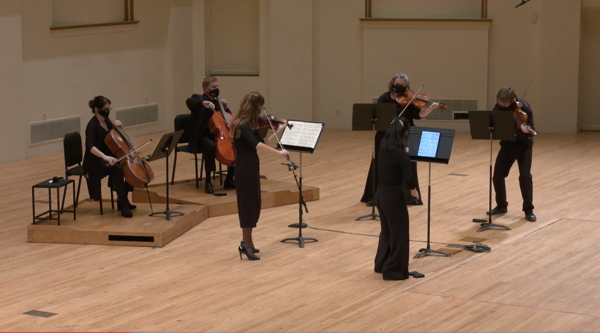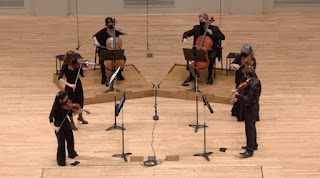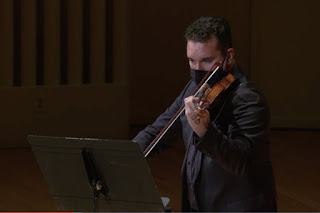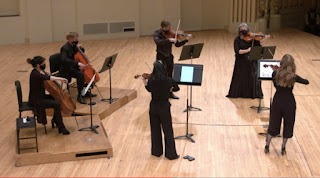
Review: The SLSO's fourth digital concert presents a little 'Night Music'
By
With smaller, physically distanced audiences and other health protocols, the St. Louis Symphony Orchestra (SLSO) has returned to live concerts in Powell Hall. At the same time, they’re releasing high-quality videos of their fall 2020 concerts, recorded live in Powell Hall.
[Find out more about the music with my symphony preview.]
 |
| The sextet from "Capriccio" |
Streaming on demand through April 24th, “Night Music” (the fourth concert in their digital series) takes you on a one-hour trip from a cozy sunset chat to a ghostly nocturnal vigil, to a dark night of guilt and regret transfigured by love into bright moonlight.
All this is accomplished with a pair of string sextets by Richard Strauss and Arnold Schoenberg, bracketing a work for solo violin and electronics by contemporary American composer Missy Mazzoli.
It all starts with the sextet that opens Richard Strauss's 1942 opera "Capriccio." It is, as SLSO cellist Bjorn Ranheim observes in his introduction, “a gorgeous piece of music with rich harmonies, like a gentle conversation between the different instruments.” You can hear that in the expertly played and well-balanced performance of Mr. Ranheim and his fellow musicians Hannah Ji and Erin Schreiber on violins, Leonid Plashinov-Johnson and Beth Guterman Chu on violas, and cellist Melissa Brooks.
Thanks to expert camera work, you can also see it in the way the players communicate with each other with their eyes, bodies, and of course, their instruments. The close-ups of the impassioned playing of Ms. Ji and Mr. Leonid Plashinov-Johnson in the turbulent central section were especially effective.
Up next is Ms. Mizzoli’s five-minute “Vespers” for violin and recorded sound, performed by SLSO second violinist Shawn Weil. The backing track includes recordings of Mr. Weil’s violin along with spectral voices and electronic drones that conjure up images of ancient cloisters and ghostly choirs.
 |
| Shawn Weil performs "Vespers" |
In a virtually empty Powell Hall, this must have raised goosebumps. As it is, I found Mr. Weil’s masterful performance darned eerie even in my living room. A video pan of the hall’s immense ceiling and the empty upper balcony seats emphasized the sense of vast musical space that surrounds this work.
The second half of the concert is taken up with Schoenberg’s 1899 tone poem "Verklärte Nacht" (“Transfigured Night”), performed by the same sextet of players as the Strauss work that opens the concert.
Written when the young composer was still trying to find his own musical voice, “"Verklärte Nacht" is based on the 1896 poem of the same name by Richard Dehmel about a women who confesses to her lover that she’s pregnant by another man as they walk together in the night. Instead of the condemnation and rejection she expects, he responds with affection and acceptance, declaring that their love will make the child their own:
Die wird das fremde Kind verklären,
Du wirst es mir, von mir gebären;
Du hast den Glanz in mich gebracht,
Du hast mich selbst zum Kind gemacht.
[Thus is transfigured the child of another man;
You will bear it for me, as my own;
You have brought your luminosity to me,
You have made me a child myself.] – translation by Scott Horton
 |
| "Verklärte Nacht" |
It is, in short, a piece that covers a wide range of sentiments. In her introduction to the performance, Ms. Schreiber observes that “every imaginable emotion is expressed during the piece,” a description that’s as accurate as it is concise.
It’s music that calls for a wide expressive range from the performers along with solid technique, and it has plenty of both in this powerful interpretation, which begins with Mr. Ranheim and Ms. Brooks reading an English translation of the original poem. Every member of the ensemble seemed thoroughly invested in the music—transfiguring it, so to speak, into something intensely personal. Indeed, Ms. Schreiber suggests as much when she says that “the music is all about transformation and catharsis and for us it felt very cathartic to get together after what felt like an eternity.”
The St. Louis Symphony Orchestra’s “Night Music” concert runs just over one hour and is available on demand through April 24th. More information on the this and other SLSO concerts is available at the orchestra's web site.


